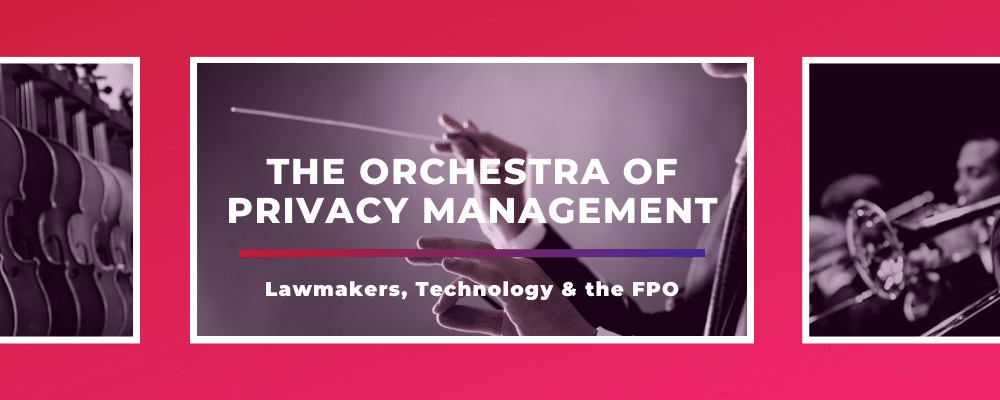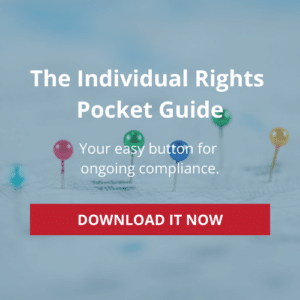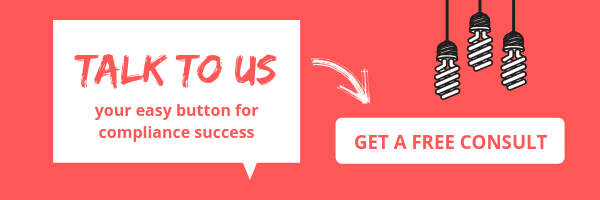
Envision a finely tuned orchestra. The composer, the conductor, the instruments, but none of it works without musicians playing the music.
The same can be said when it comes to privacy management.
Think of data privacy laws such as the GDPR, CCPA, CPA, VCDPA, CTDPA, UCPA, and other global privacy laws operating as an orchestra. The lawmaker acts as the composer, while the Fractional Privacy Officer (FPO) assumes the role of the conductor and the technology – the instruments, all essential for executing this compliance symphony.
Just as an orchestra needs the composer, conductor, and instruments to function harmoniously, so does privacy management. You can’t have one without the other.
Being a conductor – in this case, the FPO– isn’t a gesture to cue the music and walk away. The FPO and the technology go hand-in-hand, working in concert to create a unified implementation force. It’s directionally sound and delivers a satisfying result.
Breaking Down The Ensemble: The Conductor

From setting the tempo to breathing life into the entire compliance process, the FPO directs and implements the daily execution of privacy compliance across global privacy laws for your organization.
This expert also helps you create a strategy for determining your company’s technological requirements and how to integrate each piece of technology seamlessly to complement the others, much like tuning the instruments in an orchestra.
Outsourcing your privacy program management can save you time, money, and many headaches.
Here’s the deal: the compliance measures you initially established for the CCPA, CPA, VCDPA, CTDPA, and UCPA might not cut it for handling ongoing privacy issues and keeping up with evolving regulations. Simply checking the box once on compliance implementation isn’t going to fly with lawmakers anymore. In fact, most require consistent and proactive monitoring.
Sure, many companies try to handle this role in-house, but it often leaves too much room for error. It’s like expecting a top-notch violinist to conduct an orchestra. Despite being a skilled and trained musician, it’s not their area of expertise. So, it’s not wise to push a talented team lead into an arena they’re not trained to handle.
Cue the FPO.
Timing and organization are vital for building a robust privacy management program. It’s not an easy task without the right technology. And it’s even more challenging when you don’t have any at all.
The FPO assumes responsibility for the entire privacy ensemble, including:
- Interpreting & monitoring privacy laws and industry updates to maintain and ensure ongoing compliance
- Crafting and building a comprehensive privacy program
- Attentively listening to identify, maintain, report, and evaluate potential risks
These represent just a few key aspects managed by the Fractional Privacy Officer in the context of a privacy program. But this privacy guru can’t implement a privacy strategy without the right tools.
After all, every maestro needs the right instruments to create a harmonious symphony.
The Instruments of Privacy Technology

Now, consider these instruments as the privacy technology the conductor needs to create a sustainable privacy management program. The FPO can do their job effectively by leveraging full suite of solutions to comply with the GDPR, CCPA, CPA, VCDPA, CTDPA, UCPA, and new upcoming regulations. Without these tools, you run the risk of data breaches, non-compliance lawsuits, PR nightmares, and even worse, lost profits.
So, who’s the one person responsible for managing all this technology to avoid such risks?
It’s the FPO, of course! The FPO plays a key role in managing and supporting the implementation of privacy management technology. This proactive individual understands the regulations, best practices, and can measure effectiveness and mitigate risk before it happens, maintaining the complex landscape of privacy.
Privacy technology instruments are used by the FPO to:
- Streamline data inventories & maintain continuous compliance
- Maintain & update privacy notices & policies across digital platforms
- Enable cookie consent banners & maintain website scan audits
- Centrally manage & integrate consent with existing digital marketing platforms
- Automate privacy assessments to see the impact on your business
- Stay on top of new & existing privacy laws to manage compliance
- Automate consumer rights requests from intake to fulfillment
- Creating third-party risk assessments to manage vendors
- Evaluate and strategize for new or existing products/services
- Train team members on implementation & regulations
So, how do these tools come into play with the FPO as the conductor? Let’s break it down:
Creating & Mitigating Third-Party Risk Assessments
These days, the FPO has a toolbox filled with handy tools to build a solid privacy program that keeps evolving.
From handling cookie consent to performing third-party assessments, overseeing compliance, and mastering the technology, an expert can build a strong privacy program for any company.
An important aspect of this program is proactively conducting third-party risk assessments, which can help an expert minimize risk before it becomes a red flag. The FPO can assess vendors with automated assessments to ensure they aren’t a risk to the company.
Review Existing Data Inventories & Update Them with ANY New Changes
Managing data inventories is critical for compliance.
Data inventories help companies understand the full scope of their data from start to finish. It means knowing what specific pieces of information you’ve collected about each person and vendor and exactly where those pieces of information are stored.
Using an Excel spreadsheet or a Google Doc to create a data inventory won’t cut it anymore. There’s a mountain of data that needs to be mapped and updated regularly. Plus, there’s no way to create those fancy, advanced reports.
That’s where the FPO steps in as conductor – to manage this entire process and the technology that automates it.
The FPO can help manage this process by pinpointing what data you have, how it’s being used, and where it’s stored. This ensures that accurate information is entered, business purposes are approved and allowed per privacy regulations, and policies and individual rights processes are constructed accurately.
Managing an Integrated Digital Marketing Compliance Program
It can get confusing when it comes to your marketing team and the tech they are using. But creating a strong digital marketing compliance program is vital to creating personalized experiences for prospects and customers. Leveraging a unified tool for consumer requests, cookie compliance, policies and notices, and consent management can be a daunting and challenging task for your company’s marketing team to fully manage.
The laws and regulations are the least of your marketing team’s worries.
Your marketing team has quotas to meet and a marketing database they’re eager to tap into to track and reach those goals. That’s where a FPO swoops in as the expert and centrally implements preferences and consent across all marketing platforms.
Relying solely on technology without the FPO’s guidance will not get the job done.
You need this expert to train your team on how to use the technology and ensure the right information is being captured and safeguarded.
Think of it like an orchestra without a conductor – without someone to teach the music and ensure it’s being played correctly – is just a chaotic sound mess. It doesn’t work, and neither does privacy technology without an FPO.
The FPO uses his or her knowledge of the regulations to help your marketing team implement the right consent questions and policy notices necessary to collect data. They use cool technology such as cookie banners and preference management pages to create a single source of truth for marketing consent.
It’s the perfect combination of the privacy expert and the technology that’s vital for meeting your team’s needs and building a scalable program.
It takes the worry off the hands of an individual whose day-to-day job isn’t privacy.
You wouldn’t ask your star instrumentalist to lead the orchestra, right? They are great at what they do, but leading the whole show is a different ball game. The same goes for your marketing team, technology, and privacy management. It’s a team effort, and the FPO is the conductor that ensures everything stays in harmony.
Conclusion: The Complete Privacy Management Orchestra
You need both the FPO and privacy management technology to get the privacy compliance orchestra playing in sweet melodic harmony. You can’t have one without the other. They’re both essential for building a strong privacy program.
Together, they will create and maintain a solid foundation that you can handle, not just for GDPR, CCPA, CPA, VCDPA, CTDPA, and UCPA, but also any new privacy laws that come your way.
Without a designated individual in charge who can maintain the different components of technology, relying on an employee or letting the software do its thing can leave you in a sticky situation when things go south.
That’s where the FPO steps in, as an expert who knows how to interpret the language, implement the technology, and keep everything in balance to help your organization preserve trust. The role of the FPO is to navigate the privacy landscape for your company, understand the entire landscape, and devise a plan to handle your data with care.
It’s kind of like how a conductor waves his or her baton to direct the whole ensemble. Creating a process that an FPO can properly implement establishes the necessary automation and reporting you need to operate around each framework.
The FPO and technology work as one whole unit in building a solid foundation. When all parts of the orchestra work together, it creates a beautiful sound.
So, let’s cue the music and let this privacy compliance orchestra play on!
FPO FAQ
If you’re not sure if you need a Fractional Privacy Officer, you’re not alone. Most companies ask themselves these questions to determine if it’s a good fit:
- Do we have the knowledge to deal with complex privacy regulations?
- Can we afford a full-time privacy officer?
- Do we have someone who can address privacy concerns as we grow and develop new products?
- Do we have a strategic data privacy mentor?
- Do we have someone who can keep tabs on what has to be done for privacy compliance?
If you answered no to any of these questions, a Fractional Privacy Officer would be a wise addition to your team. And if you’re still not sure what a Fractional Privacy Officer does or if it’s right for you, our team of experts can help you decide.

